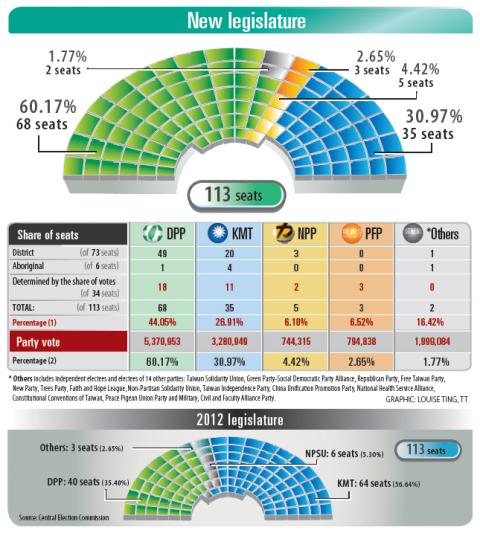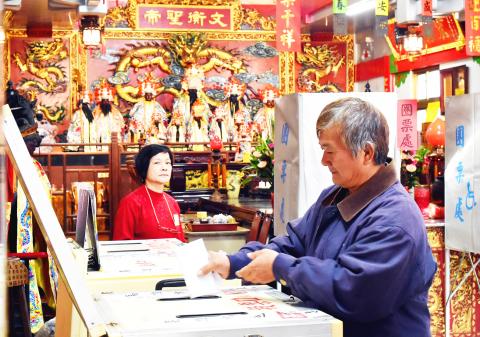The Democratic Progressive Party (DPP) won a legislative majority in yesterday’s election, securing 68 seats in the 113-seat legislature. With its ally the New Power Party (NPP) winning five legislative seats, the DPP is expected to enjoy unrestricted power in the parliament.
Before the elections, the DPP had called on voters to cast their legislative ballots for the party’s candidates to help it secure a majority in the legislature without the NPP’s assistance.
The Chinese Nationalist Party (KMT), which held 64 legislative seats before the election, hoped to secure at least 38 seats to prevent the majority party or alliance to motion for a recall of the president, which can be done with a two-thirds majority in the legislature. The DPP got what it wanted, but not the KMT.

Graphic: Louise Ting, Taipei Times
DPP president-elect Tsai Ing-wen’s (蔡英文) “coattail effect” has helped the party sweep legislative votes.
However, the real force that carried the opposition parties to victory is probably the “awakened youth,” who have been calling for the removal of the KMT from government since 2014’s Sunflower movement.
The NPP, which was established in the movement’s wake, fielded three political novices in the election — a leading activist in the Sunflower movement, a famous metal singer and a victim-turned symbol of nationwide demonstrations against abuse in the military — as its regional legislative candidates. All three got elected, defeating three veteran KMT lawmakers.

Photo: Chang Chung-yi, Taipei Times
However, while the NPP has won representation in the legislature as expected, the 5 percent threshold has proved to be a hurdle for other small parties, such as the Green Party-Social Democratic Party Alliance, the Republican Party and the Faith and Hope League, which are among parties that were established following the Sunflower movement.
The Taiwan Solidarity Union, which had three seats in the 2012 legislature, failed to cross the 5 percent threshold this time. The rise of the NPP was definitely a factor, but its decision to team up with Le Flanc Radical, a Taiwan-independence group consisting of young people, has been considered a move that came too late to garner young votes.
The People First Party’s (PFP) crossing the threshold might be seen as a coattail effect of its party chairman and presidential candidate James Soong (宋楚瑜). It was said that Soong’s bid, which was his third, was a ploy to campaign for party votes. It remains to be seen how the PFP would retain its so-called “non-blue, non-green and middle way” in a pan-green parliament.
The New Party, which received tacit support from Deputy Speaker Hung Hsiu-chu (洪秀柱) of the KMT and other KMT members who were dissatisfied with the party’s at-large legislative candidate list, made gains, winning more than 4 percent of party votes, while having only won 1.49 percent of the votes in 2012.
With the KMT’s rout, the distribution of the political power within the KMT and the pan-blue camp as a whole would be followed closely.
An interesting point raised by commentators is how the forced apology of Korean pop music group member Chou Tzu-yu (周子瑜) affected young voters and the elections’ outcome. It has been said that many young people decided to vote after the incident, in defiance of pressure from China. The DPP’s victory, in terms of its gains in party votes compared with what was expected, is said to be an outcome of the incident.
The KMT had secured 64 seats in a 113-seat legislature in 2012, while the DPP had 40 seats, the Taiwan Solidarity Union and the PFP each had 3, the Non-Partisan Solidarity Union had 2 and independents, 4.

Alain Robert, known as the "French Spider-Man," praised Alex Honnold as exceptionally well-prepared after the US climber completed a free solo ascent of Taipei 101 yesterday. Robert said Honnold's ascent of the 508m-tall skyscraper in just more than one-and-a-half hours without using safety ropes or equipment was a remarkable achievement. "This is my life," he said in an interview conducted in French, adding that he liked the feeling of being "on the edge of danger." The 63-year-old Frenchman climbed Taipei 101 using ropes in December 2004, taking about four hours to reach the top. On a one-to-10 scale of difficulty, Robert said Taipei 101

Nipah virus infection is to be officially listed as a category 5 notifiable infectious disease in Taiwan in March, while clinical treatment guidelines are being formulated, the Centers for Disease Control (CDC) said yesterday. With Nipah infections being reported in other countries and considering its relatively high fatality rate, the centers on Jan. 16 announced that it would be listed as a notifiable infectious disease to bolster the nation’s systematic early warning system and increase public awareness, the CDC said. Bangladesh reported four fatal cases last year in separate districts, with three linked to raw date palm sap consumption, CDC Epidemic Intelligence

Taiwanese and US defense groups are collaborating to introduce deployable, semi-autonomous manufacturing systems for drones and components in a boost to the nation’s supply chain resilience. Taiwan’s G-Tech Optroelectronics Corp subsidiary GTOC and the US’ Aerkomm Inc on Friday announced an agreement with fellow US-based Firestorm Lab to adopt the latter’s xCell, a technology featuring 3D printers fitted in 6.1m container units. The systems enable aerial platforms and parts to be produced in high volumes from dispersed nodes capable of rapid redeployment, to minimize the risk of enemy strikes and to meet field requirements, they said. Firestorm chief technology officer Ian Muceus said

MORE FALL: An investigation into one of Xi’s key cronies, part of a broader ‘anti-corruption’ drive, indicates that he might have a deep distrust in the military, an expert said China’s latest military purge underscores systemic risks in its shift from collective leadership to sole rule under Chinese President Xi Jinping (習近平), and could disrupt its chain of command and military capabilities, a national security official said yesterday. If decisionmaking within the Chinese Communist Party has become “irrational” under one-man rule, the Taiwan Strait and the regional situation must be approached with extreme caution, given unforeseen risks, they added. The anonymous official made the remarks as China’s Central Military Commission Vice Chairman Zhang Youxia (張又俠) and Joint Staff Department Chief of Staff Liu Zhenli (劉振立) were reportedly being investigated for suspected “serious